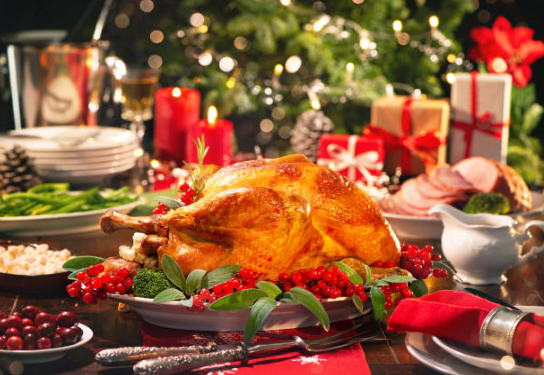Festive Foods To Eat This Christmas Based On Your Menstrual Cycle

As we all look forward to a festive blow out, just remember, ‘you are what you eat’. No, we’re not talking about piling on a few extra pounds, it’s Christmas after all! Rather, food has a significant effect on our general wellbeing, not only on our bodies but also on how we feel emotionally. More importantly, diet is also directly connected to our menstrual cycles, dictating how our bodies should function and feel.
If you experience PMS, painful periods, often have headaches, food cravings and generally feel extreme fatigue on certain days of the month, what you eat may be contributing to your symptoms and at the same time be the key to fixing these issues.
This Christmas, INTIMINA’s elves have worked tirelessly alongside gynaecologist Dr Shree Datta to pull together some key facts about what to eat during your cycle to ward off any scrooge-esque symptoms. Best gift ever!
There are four cycle phases, divided within the four week period, of an average 28 day cycle:
- The cycle starts with the Menstrual phase (lasting on average 5 days)
- Followed by the Follicular phase (day 6 to 14)
- Ovulatory phase (day 15 to 17)
- Finishing with the Luteal phase (day 18 till 28)
Different amounts of testosterone, estrogen and progesterone throughout the month require different nutritional needs. What this means is that we should not eat the same food all month long, but adjust our diet to the phase we are currently in.
By doing so we can help our body feel better during the hormonal changes and at the same time provide ourselves with the best wellbeing.
Each phase of the period cycle impacts the body differently, and understanding how your hormones fluctuate and function in each of these stages, and the physical and emotional impacts, is crucial to being able to reach your full potential over the silly season!
The Menstrual phase
Between the first and fifth day of the cycle, due to the estrogen and progesterone being low, endometrium sheds, causing bleeding, which is more commonly known as menstruation.
During this phase it’s common to experience a drop in the iron levels, that’s why it’s recommended to incorporate lots of leafy green vegetables, such as brussel sprouts – come on, it’s tradition – chicken and dark chocolate into your diet. It’s also crucial to remember to drink lots of water, to avoid dehydration that could cause headaches and bloating. (This is especially important after knocking back some festive fizz!)
If you are experiencing cramps, prepare yourself a soothing cup of wintery ginger tea – it can help relieve tensed muscles, easing period cramps. Fish, (think mini salmon blinis, voila!) is another great food that you should consider including into your diet during menstruation. Apart from its high level of iron it also is rich in Omega-3 fatty acids. These acids can help reduce the intensity of period pain, they also work as natural antidepressants, helping to regulate mood swings and fatigue. Other products that contain a proper amount of Omega-3 are nuts and flaxseed oil.
There are also some foods to avoid. Try avoiding salt, as it leads to water retention, causing bloating. The same goes for coffee…(sorry parents awoken at 6am on Christmas morning), which can additionally cause headaches. Sugar is fine in moderation, but do try not to go overboard with it, as it can worsen your mood.
A great alternative if you are craving sugar will be fruits, especially water-rich ones, such as watermelon or grapefruit or Christmas clementines. However try and avoid fruit juices as there is some evidence that these cause menstrual cramps. Lastly, well known for its negative impact on our bodies, during the menstruation, alcohol can cause even bigger trouble – dehydration, headaches, diarrhea and fatigue.
The Follicular phase
During this six to 10 day phase, while your body is preparing for the ovulation to start, at the same time it is also still a bit tired and slowed down from the menstrual phase – at this stage estrogen levels are the lowest in the whole cycle. That’s why eating energy-boosting foods is recommended.
Try including more eggs and high protein meat, like beef, wild game or salmon into your diet and make sure you are complementing iron levels. Supplementing vitamin B12 could also be a good idea for that extra energy boost. Add probiotic-rich fermented and pickled veggies, kimchi, sauerkraut or even kombucha tea to your diet to complement your diet.
The Ovulatory phase
During this short (only two days long) but very important phase, both estrogen and testosterone levels are at their peak and your body is preparing to release the egg to get potentially fertilized. This is the most energetic part of the cycle so we encourage you to embrace your energy and do more exercise.
The hormones increase female libido and sexual energy, making you feel more confident, positive, perky and sociable. You should focus on supporting your liver, so anti-inflammatory foods are a good idea – such as fruits, veggies and nuts; so smoothies and plant-based meals will be perfect for these two days.
The Luteal phase
Being the longest of all of the phases, the luteal phase starts with a surge of estrogen which then wanes within 10 days until this phase is over. You will definitely need to work on your serotonin levels during this period, as PMS will be knocking on the door.
The main focus of the diet should be products with lots of magnesium, to fight fatigue and low libido, like pumpkin seeds, chocolate or spinach…(Insider tip: we’d opt for Chocolate!). Most common PMS signs are usually bloating, mood swings and general irritability as well as strong cravings for comfort food, all caused by the rise of progesterone. High levels of this hormone can also trigger constipation and slow down your digestion, which again leads to the bloating. To fight this, remember to drink lots of water and fiber-rich food. Opt for b-vitamins and calcium and to keep the hormones in balance, drink warm cups of herbal teas, such as peppermint or chamomile.
It is worth noting that menstrual cycles and hormones are affected by contraceptive hormones, so diet may vary person to person.
For those expecting a period this festive season, INTIMINA has a full range of innovative period products for everyone this Christmas! From first timers to post-birthers and everyone else in between.
INTIMINA’s menstrual cups also make the perfect Christmas gift – compact, convenient, sustainable, reusable AND a bang for your buck too!
Not only that, but the entire range is made from body-safe, ultra-hygienic medical-grade silicone. A hypoallergenic, phthalate-free material, without any chemicals, fibers or bleach. A healthy vagina is a happy vagina!




